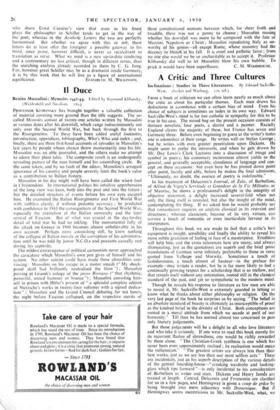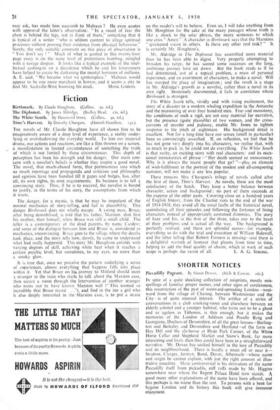A Critic and Three Cultures FROM a book of criticism
we can often learn nearly as much about the critic as about his particular themes. Each man draws his deductions in accordance with a certain bias of mind. Even his choice of subjects is sometimes an index in its own way. Edward Sackville-West's mind is far too catholic in-sympathy for this to be true in his case. The mixed bag on the present occasion consists of thirteen novelists:. four poets, a diarist and a painter. Racially England claims the majority of these, but France has seven and Germany three. Before even beginning to guess at the writer's tastes one is astonished at their range. He writes well on Stefan George ; but he writes with even greater penetration upon Dickens. He might seem to prefer the introverts, and when he gets drawn by Mr. Day Lewis's Clark Lectures into a discussion of image and symbbl in poetry, his customary incisiveness almost yields to the general, and generally acceptable, cloudiness of language and con- cept on these occasions: but even here he has pinned down point after point, lucidly and ably, before he makes the final admission, " Ultimately, no doubt, the essence of poetry is indefinable."
In his treatment of Delacroix's Journal, of Zola, of Barbellion, of Alfred de Vigny's Servitude el Grandeur de la Vie Militaire, or of Mauriac, he shows a professional's delight in the integrity of objective statement, a delight increased several-fold when not only the thing itself is revealed, but also the insight of the mind, contemplating the thing. If we asked him he would probably say that romanticism requires an analysis classical in its restraint and directness ; whereas classicism, because of its very virtues, can survive a touch of romantic or even inarticulate fervour in its interpreters.
Throughout this book we are made to feel that a critic's best equipment is insight, sensibility and finally the ability to reveal his more subtle gradation of feeling in face of a masterpiece. Erudition will help him, and the cross references here are many, and always illuminating, just as the quotations are superb and the brief prose translations of German verse infinitely preferable to those in verse quoted from Valhope and Morwitz. Sometimes a touch of fastidiousness, a touch almost of hauteur—in the preface for example—may irritate a reader, but he is far more likely to feel a continually growing respect for a scholarship that is so mellow, and that reveals itself without any ostentation, rooted still in the classical standard of the past, and yet so sympathetic to the modern mind.
Though he reveals his response to literature as few men are able to reveal it, Mr. Sackville-West is extremely guarded in letting us know what he thinks about either philosophy or religion. On the very last page of the book he surprises us by saying, "The belief in an absolute standard of beauty is ultimately as insusceptible of proof as the kindred belief in the divinity of Christ. Both conceptions are rooted in a moral attitude from which we secede at peril of our humanity." Till then he has seemed almost too concerned to pass only literary judgements.
But those judgements will be a delight to all who love literature and who take it seriously. If one were to read this book merely for its recurrent flashes of shrewdness, one would be richly rewarded by them alone. " The Christian-Greek synthesis is one which has never been even approximately realised ; its realisation would mean the millennium." " The greatest artists are always less than their best works, just as we are less than our most selfless acts." These are incidentals, just as his superb description of the various details of the genteel boarding-house----" creaking wardrobe and looking- glass which tips forward "—is only incidental to his consideration of Barbellion as writer and man. Dickens and Henry James are treated at length. Conrad, Delacroix and Fromentin are clarified for us in a few pages, and Hemingway is given a coup de grdce by being brought into mere adjacency with Domenique. But if Hemingway seems meretricious to Mr. Sackville-West, what,- we
may ask, has made him succumb to Malraux ? He even quotes with approval the latter's observation: "In a recoil of fear the chest is behind the legs, not in front of them," remarking that it is typical of a writer " who is seldom content to allege spiritual processes without proving their existence from physical. behaviour." Surely, the only suitable comment on this piece of observation is " You don't say ! " Much of what is quoted in this twenty-four page essay is on the same level of pretentious humbug, mingled with a savage despair. It looks like a typical example of the intel- lectual cashing-in on a decadence which he and his forerunners have helped to create by darkening the mental horizons of millions. A. E. said, " We become what we contemplate." Malraux would appear to be one more merchant in horror, and it seems a pity to find Mr. Sackville-West booming his stock. MONK GIBBON.







































 Previous page
Previous page